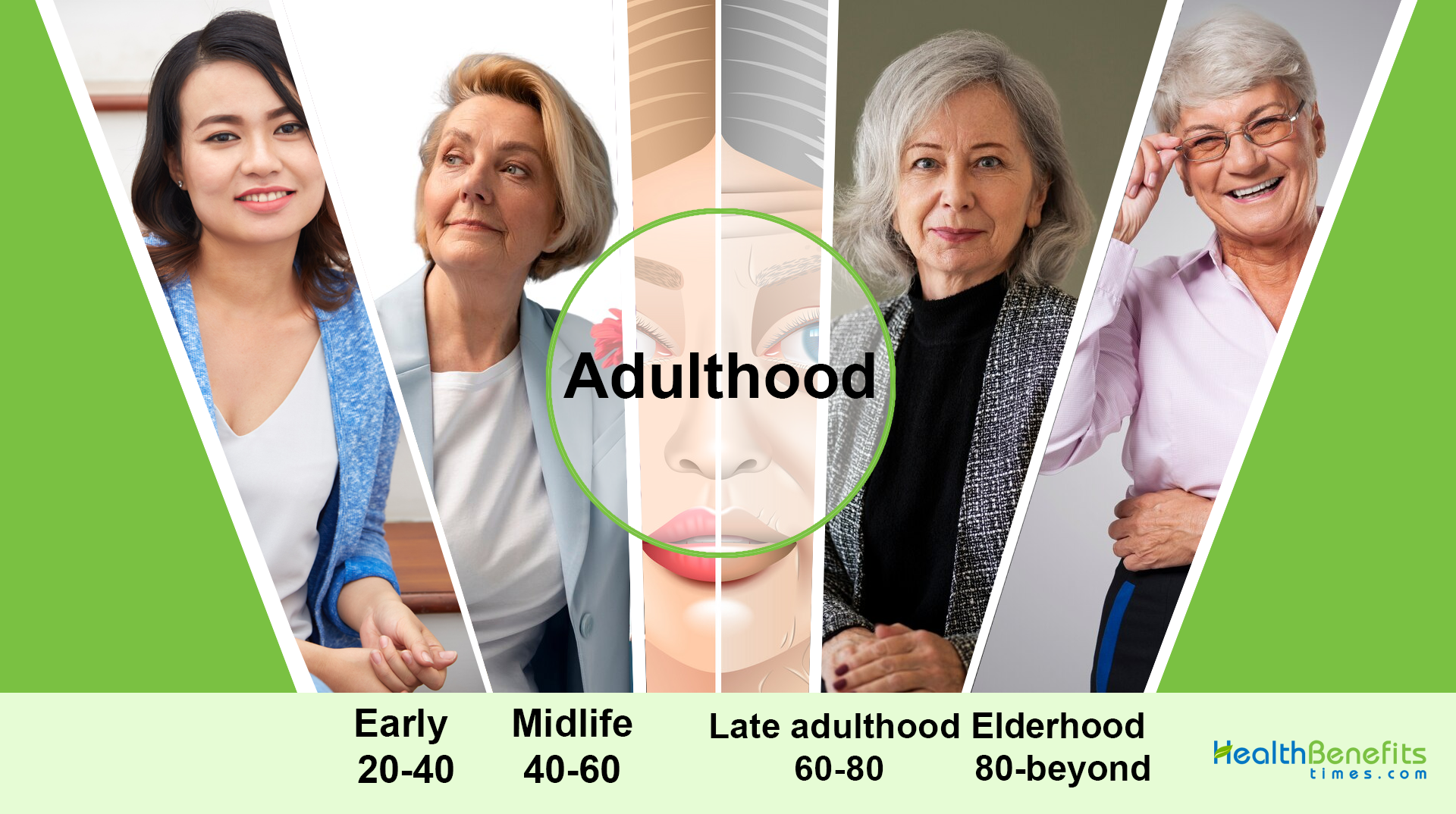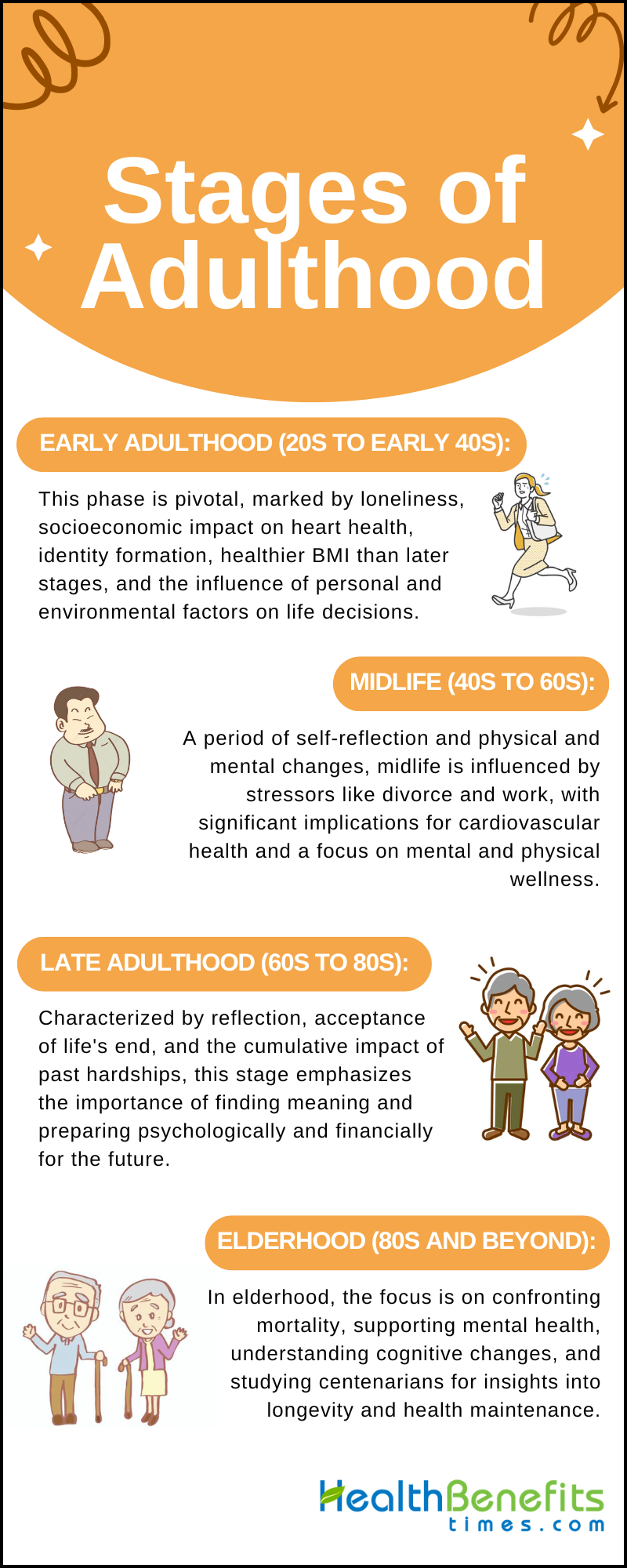Adulthood is a developmental stage characterized by assuming responsibilities, achieving psychological and social maturity, and striving for autonomy. It is a social construct influenced by various interdisciplinary factors such as education, biology, philosophy, law, economics, and psychology. The criteria for defining adulthood include accepting responsibility for one’s actions, avoiding criminal behavior, and refraining from drunk driving, which are widely accepted by both emerging adults and their parents. Adulthood is also associated with focusing on humanistic values, which enhances the social and personal significance of an individual. Throughout adult life, individuals may experience various crises, such as occupational adaptation crisis and routine crisis, which can be overcome through lifelong learning and continuous postgraduate education. Adulthood is a social category that holds power in labor markets and family relations, shaping cultural and material structures of dependency.
Difference between Adolescence and Adulthood?
Adolescence and adulthood are distinct life stages with notable differences. Adolescence is a period of transition from childhood to adulthood, characterized by puberty and the development of sexual maturation. It is a time of increased sensation seeking and exploration, which can lead to risk-taking behaviors. Adolescents may lack foresight and behave in unpredictable ways. This stage is also associated with vulnerability to the emergence of psychopathology. In contrast, adulthood is marked by independence, freedom, and responsibility. It is a time when individuals detach from their family of origin and rediscover themselves. Adults have the ability to make choices that are not necessarily lifelong but are circumstantial. They strive for autonomy and the pursuit of adult goals. The transition from adolescence to adulthood is critical, as it involves rapid changes in brain development, executive functioning, social relationships, and community context.
Stages of Adulthood
Adulthood is a stage of life marked by various transitions and changes. In early adulthood, individuals undergo a reorientation and formation of life-meaning orientations, which significantly influence their perception of the future. This stage is characterized by a strong focus on the future, self-determination, and uncertainty. Middle adulthood involves the consolidation and implementation of life meanings and plans, with a decrease in self-regulation. The social construction of age has led to increased differentiation in early life, extending throughout the lifespan. This differentiation is influenced by social change and creates uncertainties in age-related identities and behaviors. Furthermore, there are variations in experiences among individuals of the same age in different time periods. In conclusion, adulthood is a complex stage involving individual development, social change, and the formation of life meanings and plans.
1. Early adulthood (20s to early 40s)
Early adulthood, typically ranging from the 20s to the early 40s, is a significant stage of adulthood characterized by various psychological, socioeconomic, and health-related factors. During this period, individuals often experience high levels of subjective loneliness, with dissociated loneliness being the predominant type. Socioeconomic trajectories in early adulthood play a crucial role in the development of cardiovascular health in mid-adulthood, with continued education being associated with better cardiovascular health outcomes. Identity development also undergoes changes during early adulthood, with stable identity statuses such as identity achievement and foreclosure being the most common patterns. Health status is generally better in early adulthood compared to later adulthood, although no significant difference was found in body mass index (BMI) between the two groups. Residential location choices and job instability during early adulthood are influenced by individual, family, and regional characteristics. Overall, early adulthood is a dynamic and formative period that shapes various aspects of individuals’ lives.
2. Midlife (40s to 60s)
Midlife, typically occurring between the ages of 40 and 60, is a stage of adulthood characterized by significant physical and psychological changes. Research indicates that midlife is a time of intense introspection and self-examination, accompanied by changes in the body, mind, and individual psychology. Mental health during midlife can be affected by various stressors, such as divorce, caregiving responsibilities, work-related pressures, issues with adult children, and changes in physical health. Furthermore, blood pressure levels in one’s early 40s may have implications for later left atrial remodeling, underscoring the importance of monitoring cardiovascular health during midlife. Weight fluctuations during this period can also impact the risk of cardiovascular disease (CVD) mortality, with obesity in early adulthood and midlife linked to higher rates of CVD mortality. In conclusion, midlife is a crucial phase that necessitates attention to both mental and physical well-being in order to promote healthy aging.
3. Late adulthood (60s to 80s)
Late adulthood, typically occurring in the 60s to 80s, is a significant stage of adulthood. During this period, individuals face various developmental tasks and challenges. In terms of psychological well-being, it is important to find meaning and satisfaction in life. Additionally, the acceptance of a diminishing life span and imminent death becomes a prominent aspect of late adulthood. Late adulthood is also characterized by the accumulation of risks and disadvantages experienced earlier in life, such as unemployment, stress, financial hardship, and poor health, which can contribute to increased frailty in later years. Furthermore, the study of individuals in late adulthood has revealed differences in the determinants of life achievements, with instrumental-subjective abilities gaining significance. Overall, late adulthood is a time of reflection, adjustment, and the need for psychological and financial preparation.
4. Elderhood (80s and beyond)
Elderhood, defined as the stage of adulthood in the 80s and beyond, is characterized by specific challenges and experiences. Individuals in this stage must confront the acceptance of a shortened life expectancy and impending death, which can have an impact on their mental health and overall well-being. The suicide rate among the elderly is notably higher compared to other age groups, underscoring the importance of mental health support. Researchers are also interested in studying the lifestyles of centenarians to identify the factors that contribute to their longevity and good health. In terms of cognitive abilities, structural changes in the brain may result in delays in certain stages of speech production, such as lexeme retrieval, in older adults. In conclusion, elderhood is a life stage that necessitates attention to mental health, support for well-being, and an understanding of potential cognitive changes.
Physical Development in adulthood
Physical development in adulthood is influenced by various factors. Research suggests that muscular fitness indicators in childhood, such as handgrip strength and sit-ups test, have a significant positive relationship with bone health indicators in adulthood, including total body and upper limb bone mineral density (aBMD). Additionally, physical fitness in young adulthood is influenced by training and experience, rather than the natural growth process. However, as adults transition into this phase, there is a decline in the growth of both the body and mind, which may lead to reduced cognition, resilience, and mind-body-emotion-spirit integration. Furthermore, physical fitness in adulthood may also be affected by factors such as career and financial demands, time pressure, and family responsibilities. It is important to create awareness about mindful exercise during this period to promote overall well-being and reduce the risk of chronic diseases.
Cognitive Development in adulthood
Cognitive development in adulthood is a complex process involving changes in thinking and understanding. Research indicates that cognitive progress and brain growth in early adulthood are influenced by major life events, experiences, and educational opportunities. Studies have shown that cognitive abilities, including general cognitive ability, are significantly heritable and increase from childhood to early adulthood. The field of leadership development has also examined adult cognitive development, with some research emphasizing the impact of adult developmental models on leadership skills. Analysis of various theories and empirical evidence suggests that positive changes in cognitive development can occur during adulthood through mechanisms such as progression in the use of systems of meaning and knowledge and the establishment of a unified conceptual framework. Additionally, adult cognitive development has been studied in relation to social processing, self-related processing, and theory of mind, with evidence pointing to specific brain regions involved in these processes.
Psychosocial Development in adulthood
Psychosocial development in adulthood is a complex process that involves various factors and theories. Erik Erikson’s theory suggests that in early adulthood, individuals experience the psychosocial conflict of intimacy versus isolation, where the achievement of intimacy leads to healthy relationships, while isolation results in a tendency to avoid social interaction. Additionally, other theories focus on specific aspects of psychosocial development. For example, J. E. Marcia formulated a conceptual framework that identifies four ego-identity statuses, which are relevant in college settings. Furthermore, psychosocial factors such as work, generativity, positive interpersonal relationships, and spirituality can influence personal growth in aging adults. It is important for coaches to understand these developmental trajectories to better address the diverse needs of their clients. Overall, psychosocial development in adulthood encompasses various theories and factors that contribute to individuals’ growth and well-being.



